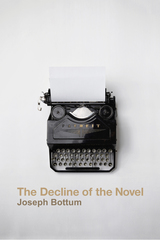
First off, this author’s cousin Roddy was keyboardist for Faith No More and currently plays with the enduring indie-pop outfit Imperial Teen. Second, Joseph “Jody” Bottum hails from one of South Dakota’s leading political families, a long-lived line of legislators that goes back to 1840s Vermont. Neither factoid leaps out as germane to The Decline of the Novel’s literary critique examining classic long-form fiction’s cultural influence and modernist impacts. However, upon reflection, Professor Bottum’s background and milieu may subtly infuse this collection of essays.
As a leading voice of a neo-conservative silent minority teaching in the humanities, Bottum is determined to align the downhill slide of mainstream American Protestantism over the past six decades to the triumph of a fragmented pop culture and a loss of a common core of values. Which relates to Roddy’s first band’s name, and his relatives representing old-line Republicans.
Intriguingly, Joseph Bottum, who first lectured in medieval philosophy, then became a Catholic public intellectual embroiled in contrarian stances resulting in his ostracizing from culture wars. Also a poet, he now runs a think-tank at one of his native state’s flagship universities, to craft professional ethics for those in information technology. This eclectic experience may not directly enter The Decline. But it subtly enriches and supports his main thesis that we’ve lost our faith.
He explains this book’s title as it “reflects and confirms a genuine cultural crisis. This is not just the old crisis of the self, but a new crisis born of the culture’s increasing failure of intellectual nerve and terminal doubt about its own progress. We have to believe in a culture to employ that culture’s art: to be much entertained by it, and to be much instructed” by its novelistic creations.
While many still read books, genre-fictions, celebrity and political biographies or hobby and self-improvement bestsellers don’t meet Bottum’s standards for works that reach “the most profound expressions of psychological, sociological, and existential truths.” Even the remnant who prefer these classic exemplars “no longer have the ear of the general culture.”
Reading for escapism or “nostalgic indulgence” fails to recapture the fickle attention of those entranced by immersion in electronically-driven gaming, online fare, and, one would add, “prestige T.V.” binge-watching.
Parts of this study also feel on replay. The gist of what’s here compiled from previous published criticism and journalism concentrates on the Protestant foundation for the invention and elaboration of the individual as he or she struggles towards success in a middle-class society, energized by the rational promise of the Enlightenment, and separated from the Catholic collective to pursue one’s own moral and practical salvation within an increasingly urban setting.
This leads Bottum into fresh territory. He examines, for instance, Samuel Richardson’s 1748 epistolary epic of female resistance to male domination. Clarissa Harlowe “demands no real changes of heart in anyone else, and she seeks to modify the world only insofar as she needs the world to leave her alone.” Contrasting an admittedly tedious 1862 riposte to Daniel Defoe’s shipwrecked rugged proto-colonial colonist, the Reverend W.H. Amberdon’s The Catholic Crusoe “grasps the Puritan center of Robinson Crusoe and inverts it into a claim of Catholic superiority.” Although Bottum often expands his analysis of recognized titles, the academic bent of this book tends towards the arcane, justly or not overlooked by other scholars. The tone tends towards the dutiful recapitulation of plot points, quoted passages and passing glances at now-forgotten tales, but as the take on Clarissa reveals, he can turn a phrase when he wants.
Rooted in a sense of self, the British and Continental novel depended on its support among the Protestant society and the common-sense capitalism of its protagonists, progenitors and purchasers. Joseph Bottum, after two opening chapters which with some overlap set the scene for the success of the novel over less than the past three hundred years, focuses respectively on Walter Scott’s Waverley (with a look at Nikolai Gogol to enliven this scrutiny), Charles Dickens’ David Copperfield, Thomas Mann’s Doctor Faustus and the Tom Wolfe’s A Man in Full. He charts the arc of the novel from its workaday connivers in Defoe, through Romantic and Victorian heydays, and into modernism towards what sputtered out of Wolfe’s “failure of nerve.”
When this collective confidence in the self-made striver, and the economic engine and moral apparatus represented by this dogged ambition. finally imploded around the middle of the 20th century across the Western world, so did Bottum’s chosen type of serious narrative. Today’s shelves feature characters divorced from their medieval ancestors, who presented themselves as “pawns in, or merely spectators to, a great supernatural battle.” Now, as his final chapter roams about the middlebrow chart-toppers of Neil Gaiman, Herman Wouk, J.K. Rowling and Charles Frazier, the professor admits that since the early ‘90s, there have been no big writers producing must-reads. The excitement of re-enchantment, he laments, has faded away.
As Bottum alludes to in an afterword, the contents of this slim volume have been reassembled from past pieces. Upon close examination, chapters do connect with one another, but this takes steady attention for the reader to discern. Without end-notes or evidence of how to track down the quotes from his original sources, whether primary or secondary, the utility of The Decline itself diminishes as a resource to lead readers to learn more from creators or critics.
Therefore, this study’s value carries a proviso. If a reader does not need to imitate the scholar, and remains content to peruse the pages of The Decline of the Novel, it’s guaranteed to point to a few finds that not even the most determined or desperate academic might have unearthed. But the rummaging in these secondhand shelves of modernity and its predecessors keeps one wondering. Bottum’s examination of fiction reaches no happy ending; instead, he leaves the reader asking along with him: what’s the purpose of art now? What is left for us to do with ourselves? (Spectrum Culture, 5/25/20)






















No comments:
Post a Comment